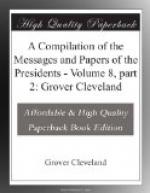The instructions to our ministers with respect to
the different belligerents were necessarily modified
with a reference to their different circumstances,
and to the condition annexed by law to the Executive
power of suspension, requiring a decree of security
to our commerce which would not result from a repeal
of the decrees of France. Instead of a pledge,
therefore, of a suspension of the embargo as to her
in case of such a repeal, it was presumed that a sufficient
inducement might be found in other considerations,
and particularly in the change produced by a compliance
with our just demands by one belligerent and a refusal
by the other in the relations between the other and
the United States. To Great Britain, whose power
on the ocean is so ascendant, it was deemed not inconsistent
with that condition to state explicitly that on her
rescinding her orders in relation to the United States
their trade would be opened with her, and remain shut
to her enemy in case of his failure to rescind his
decrees also. From France no answer has been
received, nor any indication that the requisite change
in her decrees is contemplated. The favorable
reception of the proposition to Great Britain was the
less to be doubted, as her orders of council had not
only been referred for their vindication to an acquiescence
on the part of the United States no longer to be pretended,
but as the arrangement proposed, whilst it resisted
the illegal decrees of France, involved, moreover,
substantially the precise advantages professedly aimed
at by the British orders. The arrangement has
nevertheless been rejected.
This candid and liberal experiment having thus failed,
and no other event having occurred on which a suspension
of the embargo by the Executive was authorized, it
necessarily remains in the extent originally given
to it. We have the satisfaction, however, to reflect
that in return for the privations imposed by the measure,
and which our fellow-citizens in general have borne
with patriotism, it has had the important effects
of saving our mariners and our vast mercantile property,
as well as of affording time for prosecuting the defensive
and provisional measures called for by the occasion.
It has demonstrated to foreign nations the moderation
and firmness which govern our councils, and to our
citizens the necessity of uniting in support of the
laws and the rights of their country, and has thus
long frustrated those usurpations and spoliations
which, if resisted, involved war; if submitted to,
sacrificed a vital principle of our national independence.
Under a continuance of the belligerent measures which,
in defiance of laws which consecrate the rights of
neutrals, overspread the ocean with danger, it will
rest with the wisdom of Congress to decide on the course
best adapted to such a state of things; and bringing
with them, as they do, from every part of the Union
the sentiments of our constituents, my confidence
is strengthened that in forming this decision they




